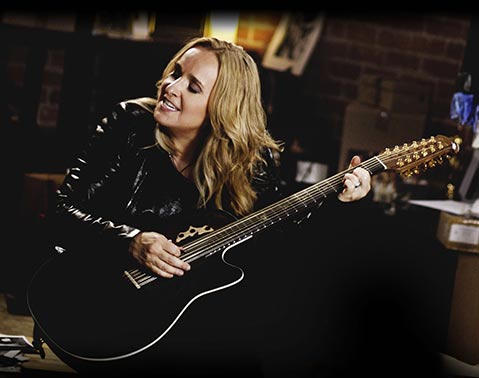This Is She: Melissa Etheridge to Play Campbell Hall
Legendary Singer Showcases New Self for Arts & Lectures Solo Performance

It’s not too often that a legendary singer/songwriter would feel the need to declare who they are late into their career. After two decades and multiple Grammys in, an artist’s name and reputation should be self-explanatory — unless you’re Melissa Etheridge. The Heartland-raised rocker, who rose to prominence in the late ’80s and early ’90s with her heartfelt tunes, comes to UCSB this Sunday, November 15, with a whole new sense of selfhood, a newfound independence proudly declared in the title of her newest work, This Is M.E.
At 54, Etheridge has found the self-centeredness and self-understanding that comes with experience. “I think a lot of it was turning 50 and what comes with that. There’s a point where you start looking at the lessons, at everything I’ve gone through and what I know, and get this thing called wisdom,” she said. “You can’t learn wisdom, you can’t teach wisdom; you have to just experience and learn it, so this album really came from that feeling.”
Thirteen albums into her celebrated career, Etheridge is still very much the woman who has inspired millions with hits like “Come to My Window” and “I’m the Only One,” but she has never been this free. This Is M.E. is her first self-released album, and the title, in part, invokes her new status of no longer being bound by a major label. The music business, Etheridge said, has “completely fallen apart,” and in its wake she has found the opportunity to be in complete control. “It’s a renaissance for artists; I can be on my own. I’m in charge of what I’m creating and what I’m doing with it, and that just feels great.”
The material on This Is M.E. finds Etheridge teaming up with new collaborators, including hip-hop producer RoccStar, though Etheridge dismisses the idea that it’s a radical departure from her roots. “I always knew hip-hop, R&B, and soul music came from the same place as rock ’n’ roll came. I didn’t like the boundaries on the genres, and I love breaking across, so this album was an opportunity,” she said. Her decidedly rocking song with RoccStar “shows you hip-hop has the same rock ’n’ roll spirit, that insightfulness, that dangerousness.”
There have been other, deeper changes, too, especially with Etheridge’s health. In 2004, she was diagnosed with breast cancer. The decade since has seen the singer change her health and lifestyle habits. While not the most rock ’n’ roll thing to do, she said, it saved her life and moved her further from an industry that, earlier on, encouraged self-destruction. “It was glorified to kill yourself. That was the end result of what we were promoting,” she said. In the beginning days, she knew it wasn’t quite the right lifestyle for her. She joked, “Even when I first started out, I felt I can’t be a rock star, because I don’t have an addiction or drug problem.”
Society, too, has changed since she started. Long one of music’s most prominent LGBT activists and spokeswomen, Etheridge has remained a hopeful example as the nation gradually grew to accept and, more recently, embrace same-sex relationships. From a time 20 years ago, when many in the LGBT community were affected by the fearful realities of AIDS and forced to conceal their identities in the public eye, to a time now when Etheridge is legally married with a wife and children, things have come a long way nationally. Etheridge said she feels happy to be a part of the larger story. “It’s truly amazing to be part of the fabric.”
Etheridge will play solo — just her and her instruments: a guitar, a piano, hand drums, and even a loop pedal. She will revisit old songs, new again in her hands. It will be Melissa Etheridge, truly independent and truly herself in a new way. She’s the only one, and she’s one-of-a-kind.
4·1·1
Melissa Etheridge plays Sunday, November 15, at 7 p.m., at UCSB’s Campbell Hall. Call (805) 893-3535 or visit artsandlectures.sa.ucsb.edu.



